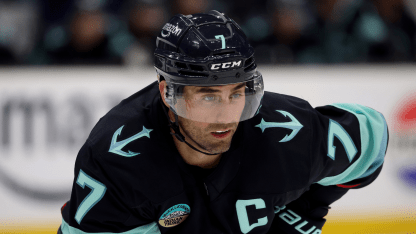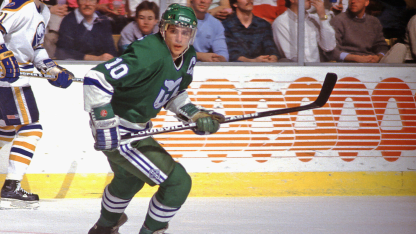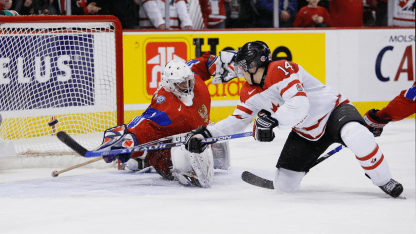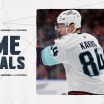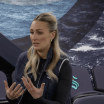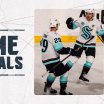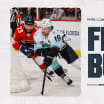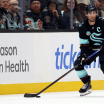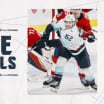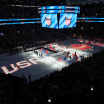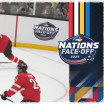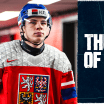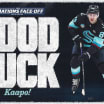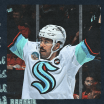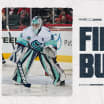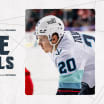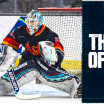Neil Tulloch remembers coaching Kraken winger Jordan Eberle the prior time he’d donned a captain’s “C” on his uniform before now.
All it took to earn the honor was Eberle, at age 9, scoring 216 goals in a 60-game season for his Novice-level Kings team as it won the Saskatchewan city of Regina’s Tier 1 championship in 1999-2000. The Kings went 53-5-2, and with Eberle averaging 3.3 goals per game, there wasn’t much debate about who the team leader was.
“He was just one of those guys that tried to be a passer,” said Tulloch, the Kings’ head coach that magical season and now running a Regina law firm. “He certainly wasn’t a puck hog.
“It’s just hard to pass to anybody when you’re 40 or 50 feet ahead of them.”
Eberle, after Tuesday’s season opener against St. Louis in which he was introduced as the Kraken’s new captain, joked that he’d never been one before except maybe in the “Novice and Atom” ranks. Turns out his memory was correct, though a case for having the “C” much more recently could easily have been made.
Still, becoming a hockey captain usually takes more than simply being your team’s highest-scoring player. No other sport places as much importance and emphasis on the singular captain’s role, where the chosen player by rule is the only one allowed to talk to the referee and often expected to become his team’s leader and even ambassador on and off the ice.
While football has multiple captains, and some sports simply anoint their biggest stars to the role, hockey captains must be able to lead. Perhaps it’s due to the fast-paced, on-the-fly nature of the sport where quick thinking and composure come in handy.
Or, the grueling 82-game nature of the schedule, followed by a two-month player journey to the Stanley Cup. But without finding that strong captain to lead them over time and through tribulation – either by example, quiet confidence, sheer Alpha dominance, or sometimes all of those traits – many teams have lost their way.
And though NHL teams have had captains for more than a century, there’s still no exact leadership prototype for the perfect one.
Montreal Canadiens captain Maurice “The Rocket” Richard was an explosive goal scorer with a fiery temper who once was suspended the remainder of the 1955 season and playoffs – prompting a subsequent riot – for inadvertently slugging a linesman during one of his many on-ice battles. But Richard’s successor as captain following his 1960 retirement, Jean Beliveau, was the epitome of on-and-off-ice grace and typically referred to as the greatest ambassador the sport has ever known.
More recently, longtime Detroit Red Wings captain and current general manager Steve Yzerman was heralded for the quiet, fierce intensity he brought to the role throughout the 1980s, 1990s and 2000s. Yzerman, a three-time Cup winner dubbed “The Captain” for how he came to epitomize the role, was never one to get overly vocal with teammates and mostly just led by example.
Mark Messier, now an ESPN analyst who worked Tuesday’s game where Eberle’s captaincy was announced, played in the same era as Yzerman but was far more outwardly vocal and passionate. Messier captained the 1990 Oilers to the Cup and then the 1994 New York Rangers – earning the nickname “The Messiah” for delivering a long-awaited title to the Big Apple.
But Messier also brought a visible mean streak to his game – even once threatening to swing a stick at Hall of Fame defenseman Larry Robinson during an early career playoff game. Wayne Gretzky, who preceded Messier as Oilers captain, would never dare do something like that. Nor would current Oilers captain Connor McDavid, known more for taking abuse than dishing it out.
Still, hockey fans in recent weeks were shocked by previously unseen footage of McDavid yelling at teammates in the Oilers dressing room following a Game 3 loss to Florida in last spring’s Cup Final that put Edmonton in a 3-0 hole. The footage, part of Prime Video’s Faceoff: Inside The NHL series, if anything, showed fans don’t often see the true passion lurking beneath the surface of those anointed as NHL captains.
“Everybody leads differently,” said Kraken general manager Ron Francis, who was 12 years younger than Eberle when named captain of the Hartford Whalers at age 22 in 1984-85. “But I think some of the traits are, you’ve got to be somebody your teammates respect. Somebody who respects the game and how you go about preparing yourself both on and off the ice. And how you represent your organization and teammates on the ice and in the community.”

